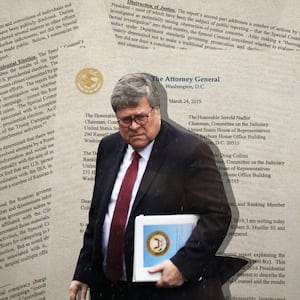Attorney General William Barr’s letter to Congress regarding the Mueller report raises more questions than it answers.
On Sunday, Barr sent a four-page letter to Congress reporting the conclusion of Special Counsel Robert Mueller’s investigation into any links between Russia and Donald Trump’s campaign to interfere with the 2016 presidential election. The letter purported to reveal Mueller’s principal findings, but it raises several significant questions that can be answered only by disclosure of Mueller’s entire report, which the Justice Department says is more than 300 pages.
First, although media reports and President Trump have declared that Mueller found no “collusion,” Barr’s letter instead says that “the investigation did not establish that members of the Trump Campaign conspired or coordinated with the Russian government in its election interference activities.” These are two different things. Sometimes I am unable to find my car keys in my house, but that does not mean that they aren’t there. In the same way, just because Mueller did not establish that Trump’s campaign conspired or coordinated with Russia does not mean that there was no inappropriate contact. To be sure, Mueller is a skilled prosecutor who investigated diligently. If he found insufficient evidence to establish a crime of conspiracy, we can be satisfied that the crime cannot be charged.
But what about the Trump Tower meeting in June 2016 between Russians and Trump’s inner circle to provide dirt on Hillary Clinton? Why did Trump issue a misleading press release about the meeting? Why did Trump associates Michael Flynn, George Papadopoulos and Michael Cohen lie about contacts with Russia? Even if we are not going to hold Trump accountable for any misconduct, we still need to understand Russia’s tactics to attack our elections so that we can protect them in the future.
Second, why did Mueller decline to reach a legal conclusion regarding obstruction of justice? I have never seen a case where a prosecutor simply threw up his hands on the ultimate decision of whether he believed charges should be brought. In baseball, a tie goes to the runner. In prosecution, a tie goes to the accused. In fact, under Department of Justice policy, criminal charges should be brought only if the prosecutor believes that a person’s conduct constitutes a federal offense, and that the admissible evidence will probably be sufficient to obtain and sustain a conviction. This is a higher standard than probable cause. If the admissible evidence is not there, then the prosecutor should decline to file charges.
We know from the conspiracy question that Mueller knew how to make a declination decision. So why did he decline to make a prosecutorial judgment, one way or the other, regarding obstruction? Did he believe that because a DOJ opinion says that a sitting president cannot be indicted, recommending charges for obstruction of justice was not within his purview? Did he instead intend to provide his factual findings to Congress so that it could decide whether the facts rose to the level of high crimes and misdemeanors for which impeachment is appropriate? Did Mueller know that Barr would step in and decide for him?
Third, why did Barr decide the obstruction question himself? His letter states that Mueller’s decision to reach no conclusion “leaves it to the Attorney General to determine whether the conduct described in the report constitutes a crime.” Why? Doesn’t it defeat the entire purpose of having a special counsel to have the presidentially appointed attorney general make the ultimate decision? The whole point of appointing a special counsel is to insulate the decision-maker from the executive branch chain of command so that the public can have confidence that his decision is free from political considerations. If Barr was just going to make the decision, we could have dispensed with a special counsel altogether. The decision as to whether obstruction of justice occurred could credibly have been made by Mueller or Congress, but why Barr?
Fourth, what is the legal standard that Barr was applying? If a sitting president cannot be indicted, then why is he applying the standards that are used to charge a defendant in a criminal case? Barr’s letter states that to establish obstruction by Trump, “the government would need to prove beyond a reasonable doubt that a person, acting with corrupt intent, engaged in obstructive conduct with a sufficient nexus to a pending or contemplated proceeding.” This is the legal standard that is to be used in convicting someone charged in an indictment, not in an impeachment proceeding, where the standard of proof is not defined in the Constitution. Rather than analyzing the facts under a standard that would apply in a criminal case against the president, which we are told is legally impossible, shouldn’t the facts instead be presented to Congress for it to decide whether they amount to high crimes or misdemeanors? And did Barr use the standard he set forth in the 19-page memo that he sent to DOJ before he became attorney general, opining that a president cannot obstruct justice as a matter of law if he is exercising his constitutional powers?
Fifth, Barr’s letter says that “most” of Trump’s behavior that creates obstruction of justice concerns has been the subject of public reporting. That means that at least some of his behavior has not been publicly reported. What additional obstructionist conduct did Trump commit?
Sixth, why haven’t we seen all or most of Mueller’s report already? He and Barr knew that the public would clamor for his report as soon as it was complete. Barr’s letter says that he will work with Mueller to remove references to grand jury material and information pertaining to other ongoing investigations, which cannot be publicly released. Knowing that this step would be necessary, Mueller could have written the report in such a way as to minimize reference to grand jury material or written an executive summary with a redacted appendix containing the sensitive material. Is Barr’s delay a device to sensitize the public to his conclusions, so that by the time we see the full report, we will have moved on? Or by offering his own opinion that obstruction of justice did not occur, is he hoping to make it politically difficult for Congress to undertake impeachment proceedings based on an opposite conclusion?
While the law protects certain matters from public disclosure, our democracy depends on an informed electorate. Only by sharing Mueller’s full report with Congress and the public can we begin to answer these questions, hold our public officials accountable for their actions, and protect our elections from future attacks.






